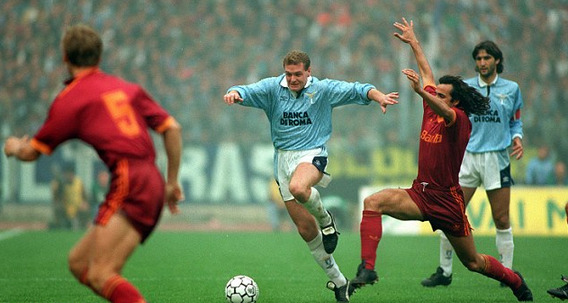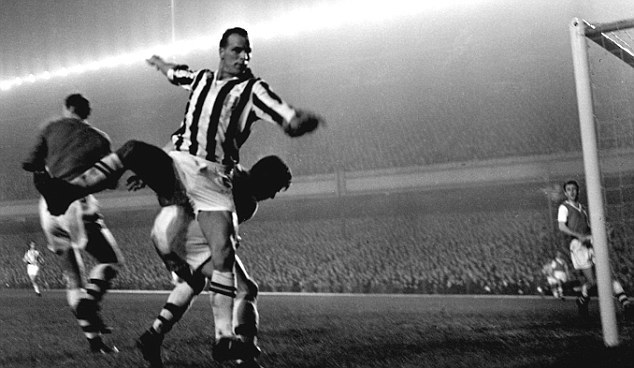The Stagnant Inventors
The Stagnant Inventors

The Stagnant Inventors
When the urbane Anglo-French philosopher Joseph Barton posed a question on BT Sport about English footballers who had played in Serie A, the first thought was ‘why would anybody sign Franz Carr?’ Within a few days, the Welshman Gareth Bale had moved to Real Madrid and this prompted the wider question of why so few British players seem to make a positive impact at clubs outside the UK.
Naturally, there are exceptions: Chris Waddle was impressive at Marseille, David Platt did well during four years in Italy and Juventus fans voted a Welshman of an earlier vintage, John Charles, as their best-ever foreign player. For the most part, however, British exports have been a profound disappointment.
Britain’s residual imperialist and insular attitudes do not help. The UK is resolutely and determinedly monolingual, with a goodly number struggling even with the ‘mono’ bit. Other European nationals, much more comfortable with the concept of conversing in more than one language, are naturally going to adapt more easily to new surroundings.
This malaise helped to spawn a ‘we invented the game and foreigners can teach us nothing’ belief that exists even to the present day. Yes, look at those Spaniards and their endless passing, for goodness sake. While there may be a grudging admiration for it, it’s still not quite right, a bit boring and not a little sneaky. People were doubtless having similar thoughts about the 1953 Hungarian team.
Back to the present day and Bale is not, perhaps, a footballer who would appeal to Barcelona, but neither does he conform to British stereotypes. He does, at least, appear to have been engineered at one of the more upmarket workshops and it is perfectly plausible that he will succeed in a football sense. It is, though, hard to avoid the conclusion that Bale, along with one or two others like the Jack Wilshere and Rodwell, is an exception to the general laws of British footballers.
It’s difficult to imagine Andy Carroll, for example, playing anywhere except in the UK. One commentator, conjuring up a truly memorable image, likened Carroll to a medieval siege-engine and in European terms, the hulking centre-forward appears as outdated as a trebuchet. As early as 1453, the Ottomans proved that such methods should be consigned to parchment while negotiating a tricky away fixture at Constantinople. Merely firing very large, pony-tailed Geordies over city walls was no longer the way forward. It may be acceptable in the context of West Ham United versus Stoke City, but sophisticated modern Europeans will simply not tolerate this kind of thing.
Take Scott Parker, as indeed many clubs have. This is not to suggest that Parker is devoid of ability or to doubt his abundant energy and commitment. It’s just that if you’re looking for a player to run more kilometres in a match than anyone else, or you need a chap to block a thunderous shot with his face, then Scott’s your man. It’s true that Italy produced Gennaro Gattuso, but even so, Scott Parker seems the quintessential English midfield player.
The Scottish equivalent is Scott Brown, although this package comes with extra attitude and tattoos. Intriguingly, when it appeared as if Brown might be on his way out of Celtic a couple of years ago, the one club to show a great deal of interest was Tottenham Hotspur, part of whose midfield was Scott Parker.
The problem seems to be a mix of the socio-cultural, football-cultural and the rather basic fact that a lot of British footballers are not very good. From time to time, an Italian club owner may be amused by the thought of a snorting bull of a centre forward, a shouty, square-ball obsessed midfield player or a defender that throws his head into places that even Robocop would politely withdraw from, but ultimately the novelty wears off and our hero returns to play for Blackburn Rovers or Sheffield United after a dozen games, no goals and seven yellow cards.
It’s hard to avoid the conclusion that British football continues to exist and evolve with a type of Galapagos-style isolation to the rest of the world, even as the world’s brightest talents showcase their technique and tactical nous at the country’s biggest clubs. Despite the vast number of foreign players in the British game, there remains a curious and possibly subconscious resistance to change. It seems inevitable that for every Gareth Bale, there will be an Andy Carroll, a Scott Parker, a Scott Brown and a host of other worthy, but not terribly talented, journeymen.
This piece was written by Tom Locke. And for those interested in British footballers abroad, be sure to give Les Rosbifs your time. Comments below please.









